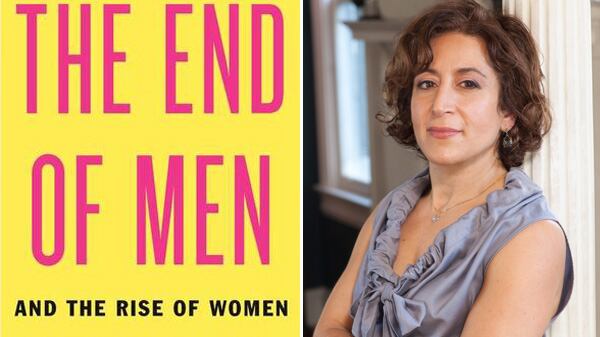There are a few things that happen when you attempt to travel the streets of New York with a bright yellow book that screams The End of Men under your arm. First, you get a lot of inquisitive stares. Some people snicker. When you accidentally leave the book on the counter of your morning coffee shop, the man who returns it to you points to the cover, giggles, and does a little jig.
But if you are the author of a book called The End of Men—with a man for a husband and a boy for a child—you get sticky notes left on your bedroom door. “My 6-year-old, to whom the book is dedicated, writes things like, ‘Only bullies write books called The End of Men,’” says author Hanna Rosin, whose 2010 Atlantic essay turned 310-page book hit stands this week. She clarifies: “He’s learning about bullying in school.”
Remember, say, a decade ago, when men were ruling the world? Remember, you know, dudes? They made up half the population, held the majority of power jobs, were the primary breadwinners, and have been the dominant sex since, well, the beginning of time?
Well, they had a great run. Because, if you believe the headlines—or, you know, the half-dozen books, the endless articles, the Morgan Spurlock movie, or the five (yes, five!) TV pilots based on man’s place in the world—you’ve gotten the point by now: after 200,000 years, the era of male domination is over. Women will rule the world.
Rosin, of course, is not the first to make this point. As my Newsweek colleagues noted in a cover story two years ago, the media have long dubbed men in “decline,” as well as “stiffed,” “attacked” and victims of a “mancession.” (They argued for a new meaning to the word “macho.”) But Rosin was perhaps the first to string all the economic realities together in such staggering form. Laid out under a certain headline, plastered on the cover of the Atlantic, and well—damn —it seemed we suddenly had a full-on gender role reversal.
In case you need a refresher, Rosin’s case that men are ending goes something like this:
For the first time in history, men no longer dominate the workforce. For the first time in history, they are graduating from college in lower numbers than their female peers. (They also earn fewer graduate degrees.) For the first time in history, men may not be the future breadwinners of the world (and of the 15 job categories projected to grow the most over the next decade, they occupy only two—janitor and computer engineer.)
There are a bazillion other reasons: delay in marriage, sexual liberation, the desire among some women to raise children on their own. Feminism. Girls. Hookup culture. Even sperm seems to have become a matriarchy: at a company called MicroStart, which offers a yet-to-be-FDA-approved method for sperm selection, requests for girls flood in at a rate three times that for boys.

“Hell, get out of the way,” one researcher, a biologist who conducted early gender-selection studies, tells Rosin. “These females are going to leave us males in the dust.”
The reality, of course, is that they already have—and there are many men who cope just fine. Finding daddy with the baby bjorn seems just about normal these days. Sites like the Good Men Project have sprung up to promote modern male acceptance, and, according to at least one study, men are actually more comfortable with the idea of stay-at-home dads than women are.
And yet, while the economy has picked up somewhat since Rosin’s original essay hit stands, many men, she says—even those who claim they are OK with the new state of the world—find themselves grasping for identity.
“It’s the old Betty Friedan case—but in masculine form,” says Rosin. She calls this “Plastic Woman” and “Cardboard Man”: the idea that women, ever flexible in their ways, are taking on new duties, while men remain rigid in their ways. Men, she explains, have “lost the old architecture of manliness, but they have not replaced it with any obvious new one.”
To show how it all plays out, Rosin spent many months reporting—and, indeed, The End of Men is rigorously researched. She spent time at the Yale School of Management, where, in her first chapter, she describes young women who use the “hookup culture” (memo to book authors: nobody in the “hookup culture” actually calls it the “hookup culture”) as a “delay tactic” to marriage—and instead focus on their studies, internships, and future careers. (“What do I need a man for?” one woman asks her. “I don’t need him financially. I don’t need him to do activities. I have lots of friends here. So fuck it.”)
She traveled to a mill town in Alexander City, Ala.—the subject of a New York Times Magazine cover story—where she finds a breed of middle-class women who work to support their out-of-work husbands, and men struggle to be OK with it. (“I pretty much internalize it,” one man explains. “It’s like, if I can’t take care of her, then I’m not a man.”)
She also touches on parenting, including her own struggles—how do you raise boys to embrace this new world order?—charts the feminization of pharmacy work, and depicts the rise in female violence as women gain power. In the end, she rounds it out with a chapter on nice girls and the corner office—and, of course, just how much further we’ve still got to go.
Ultimately, Rosin knows all too well that it is not actually the end of men—and she’s got a husband (Slate editor David Plotz, who will interview her about her book this week) and a son (to whom the book is dedicated, “with apologies for the title”) to remind her of it.
In the end, what it may well be is not the end of men at all, but the end of a certain kind of man: the Don Draper, bringing-home-the-bacon, gender role–specific kind of guy who refuses to do the laundry, pick up the kids, and can’t quite come to terms with his wife being behind an executive table, and not a blender. And perhaps it’s that kind of man that we’ve said goodbye to a long time ago.
As one modern New York man puts it: “The typical 20th-century man is dead. He’s been buried. We grieved,” says Matthew Slutsky, 31. “But, now it’s all about the new era of man. One that is willing to stay at home, and, in this economy, sometimes knows he must.”
Rosin says her goal is to help men and women learn to navigate these changes, not draw battle lines based on gender. Which is a noble effort … as long as you can get past that pesky title.





